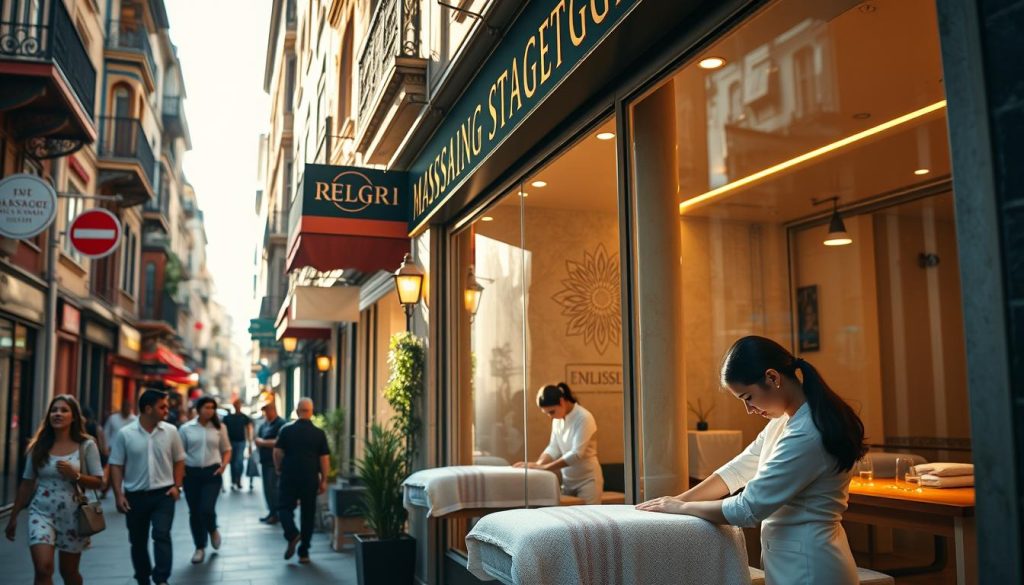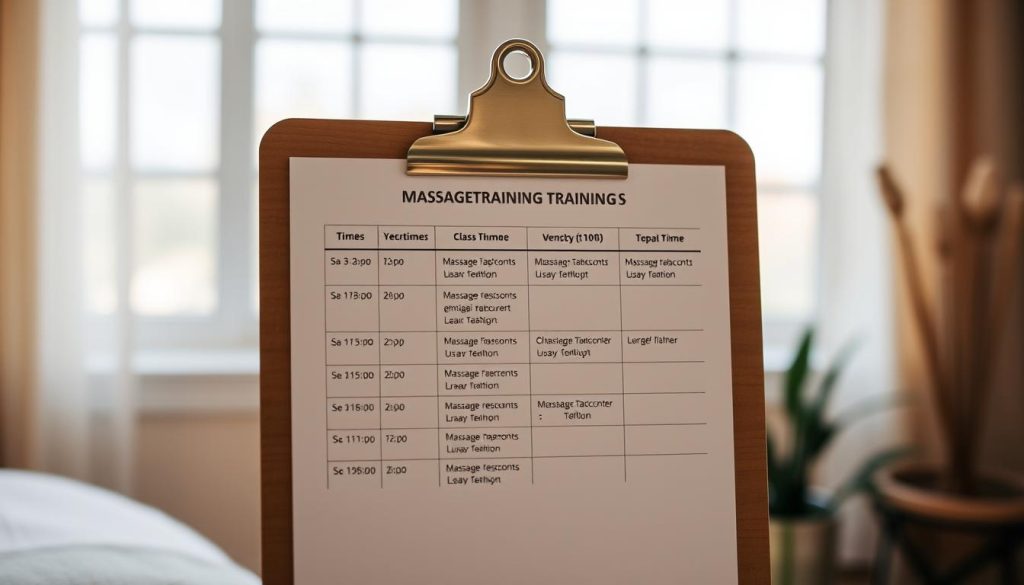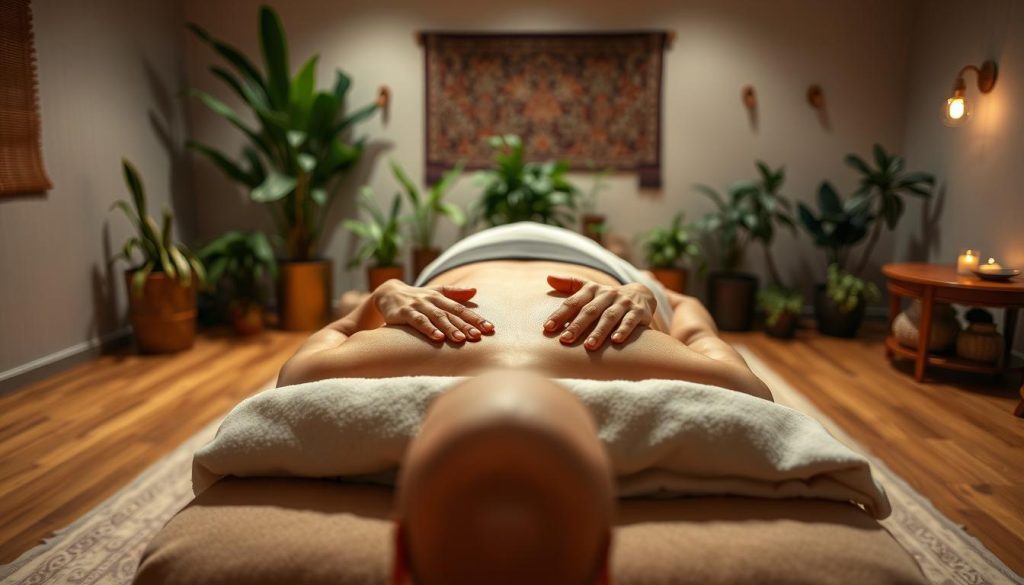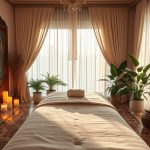Imagine ancient Turkish hammam wisdom blending with modern massage techniques. This unique fusion awaits you in Istanbul. Your journey to become a skilled massage therapist begins in this historic city.
Istanbul offers comprehensive massage training programs combining Western and Eastern methods. The city’s vibrant culture values the art of touch and relaxation. As global demand for skilled therapists grows, Istanbul prepares you with essential knowledge.
In Istanbul, you’re inheriting a legacy of healing traditions. The city’s position between continents makes it ideal for aspiring therapists. You’ll learn diverse practices, from soothing Swedish strokes to invigorating Turkish hammam rituals.
Key Takeaways
- Istanbul offers diverse massage training programs
- Learn both Western and Eastern massage techniques
- High global demand for skilled massage therapists
- Rich history of Turkish hammam culture influences training
- Unique opportunity to study in a city bridging East and West
- Comprehensive programs prepare you for a rewarding career
Understanding Professional Massage Training Fundamentals
Professional massage training blends art and science. It teaches you to become a skilled masseuse. You’ll learn various massage techniques and their uses.
Western vs Eastern Massage Techniques
Massage techniques fall into Western and Eastern categories. Western methods often use oil-based techniques like Swedish and deep tissue massage.
Eastern techniques focus on acupressure-based practices. These include Thai massage and reflexology.
| Western Techniques | Eastern Techniques |
|---|---|
| Swedish Massage | Thai Massage |
| Deep Tissue Massage | Reflexology |
| Sports Massage | Shiatsu |
Core Skills and Competencies
Becoming a skilled masseuse requires mastering several core competencies. These include anatomy knowledge, proper body mechanics, and effective communication skills.
You’ll learn to assess client needs. You’ll also apply the right massage techniques for the best results.
Importance of Professional Certification
Professional certification is crucial in the massage industry. It proves your skills and knowledge, boosting your credibility as a masseuse.
Many training programs offer certification upon completion. This prepares you for a successful career in massage therapy.
“Certification is not just a piece of paper; it’s a testament to your dedication and expertise in the field of massage therapy.”
Why Choose Istanbul for Massage Training
Istanbul is an ideal place for massage training. It blends Eastern and Western cultures, offering diverse massage techniques. You’ll learn both traditional Turkish methods and modern wellness approaches.
The city’s rich heritage creates an immersive learning environment. World-class facilities with cutting-edge technology await you. Experienced instructors bring vast knowledge to your training.
Istanbul’s lower living costs make extended training more affordable. This is especially beneficial for international students seeking comprehensive education.

Istanbul’s spa scene offers a wide range of treatments. The Four Seasons Hotel provides luxurious experiences combining ancient and modern techniques. Their signature treatments last 120 minutes, offering comprehensive wellness experiences.
As a trained therapist in Istanbul, you’ll use essential oils like frankincense and lavender. You’ll master specialized techniques such as the Traditional Turkish Hammam.
This diverse skill set will set you apart in the wellness industry. It prepares you for a rewarding career in massage therapy.
Types of Massage Courses Available in Istanbul
Istanbul boasts a diverse range of massage training programs. These courses cater to various styles, each offering unique benefits. Let’s explore some popular options in this vibrant city.
Traditional Turkish Massage Programs
Turkish massage courses combine ancient techniques with modern practices. They often include hammam rituals and foam massage techniques. You’ll learn to use traditional tools and master full-body relaxation.
Turkish massage training typically lasts one month. It involves 20 hours of hands-on instruction.
Swedish Massage Certification
Swedish massage courses focus on Western techniques. You’ll learn long strokes, kneading, and circular movements to improve circulation. These programs usually run for 2-3 months.
They provide in-depth knowledge of anatomy and physiology. You’ll gain skills to relieve tension effectively.
Deep Tissue Massage Training
Deep tissue massage courses target deeper layers of muscle and connective tissue. You’ll learn techniques to alleviate chronic pain and muscle tension. These programs include practical sessions to sharpen your skills.
Sports Massage Courses
Sports massage training prepares you to work with athletes and active individuals. You’ll learn injury prevention, performance enhancement, and recovery techniques. These courses blend Eastern and Western massage styles.
Most massage courses in Istanbul have basic requirements. Participants must be over 18 and have primary school education. After completing the course, you’ll take exams to earn your certificate.
Course Duration and Scheduling Options

Istanbul’s massage courses offer flexible schedules to fit various lifestyles. Options range from week-long intensive programs to month-long comprehensive trainings. Choose a schedule that matches your needs and learning pace.
Short courses last 7 to 14 days, perfect for quick certification. These cover essential techniques and theory in a condensed timeframe. Longer courses span 3 to 4 weeks, providing extensive hands-on practice and advanced techniques.
Many schools have part-time and evening classes for those with other commitments. Some even offer weekend-only options. This allows you to train without disrupting your weekday routine.
| Course Duration | Focus | Average Price Range (USD) |
|---|---|---|
| 7 Days | Thai Massage, Deep Tissue | 1,202 – 1,651 |
| 13-15 Days | Multi-Style Yoga & Massage | 658 – 700 |
| 25-28 Days | Ayurvedic Massage, Yoga TTC | 1,000 – 3,409 |
Consider Istanbul’s peak tourist seasons when planning your training. They may affect accommodation availability. Some schools offer year-round courses, while others operate seasonally. Book your preferred massage course early, especially for popular programs with limited spots.
Massage Training in Istanbul: Program Structure and Curriculum
Istanbul’s massage training programs offer a thorough mix of theory and practice. You’ll gain the expertise needed for a successful massage therapy career. The curriculum covers essential topics and hands-on skills.
Theoretical Knowledge Components
The theory part covers anatomy, physiology, and massage concepts. You’ll learn about human body structure and function. This knowledge helps you create effective treatment plans.
Understanding how massage techniques affect the body is crucial. It forms the basis for your future practice.
Practical Training Sessions
Hands-on experience is a key part of the training. You’ll practice various massage techniques in real-world scenarios. These sessions focus on both Turkish and Western massage methods.
Assessment Methods
Your progress is checked through written exams and practical demonstrations. Case studies are also used to evaluate your skills. This thorough assessment ensures you’re ready for the industry.
| Program Component | Duration | Focus Areas |
|---|---|---|
| Theoretical Study | 3 months | Anatomy, Physiology, Massage Theory |
| Practical Training | 4 months | Technique Application, Client Interaction |
| Assessment | 1 month | Written Exams, Practical Demonstrations |
Istanbul’s massage training programs provide a complete education. You’ll learn both Eastern and Western techniques. This diverse skill set is highly valued in the global wellness industry.
Investment and Pricing Details
Massage training costs in Istanbul are important to consider. The city offers various courses at competitive prices. This makes it appealing for those pursuing a massage therapy career.
Course Fee Structures
Massage training costs in Istanbul depend on program type and length. Basic courses begin at $500. Advanced certifications can cost up to $2,500.
Fees typically cover study materials and hands-on sessions. The price varies based on the specific program you choose.
| Course Type | Duration | Price Range (USD) |
|---|---|---|
| Introductory Massage | 1-2 weeks | 500-800 |
| Swedish Massage | 4-6 weeks | 1,000-1,500 |
| Deep Tissue Massage | 6-8 weeks | 1,500-2,000 |
| Sports Massage | 8-10 weeks | 2,000-2,500 |
Payment Plans and Options
Many schools offer flexible payment plans for massage courses. You can often choose between upfront payments with discounts or monthly installments.
Some institutes work with local banks to provide student loans. This helps make the courses more affordable for students.
Additional Training Costs
When planning your budget, consider extra expenses. These may include textbooks ($100-$200) and massage oils ($50-$100). A massage table for home practice can cost $200-$500.
Sports massage courses might need specific equipment. This can increase your overall costs.

Quality massage training in Istanbul can lead to rewarding career opportunities. With careful planning, you can find a program that fits your budget.
Training Facilities and Equipment
Istanbul’s massage training facilities offer top-notch environments that mimic professional settings. They’re equipped with high-quality massage tables, linens, and oils. Students get hands-on experience with industry-standard tools, preparing them for real-world scenarios.
Many programs in Istanbul include traditional Turkish hammam facilities. This unique feature allows students to learn authentic techniques in a genuine setting. The Peninsula Istanbul has two Turkish hammams, providing an authentic experience for trainees.
The massage equipment varies based on the techniques taught. You’ll have access to hot stones and specialized massage tools. This exposure prepares you for diverse client needs in your future career.
Some facilities, like the Mandarin Oriental Bosphorus, offer large wellness areas. With 3,500 square meters for spa and wellness, these spaces provide ample room for training.
- Separate men’s and women’s steam rooms and saunas
- Pilates and spinning studios
- Indoor and outdoor pools
- State-of-the-art gym equipment
Training in these comprehensive facilities with professional equipment builds essential skills. You’ll gain the confidence needed to excel in the massage therapy industry.
Instructor Qualifications and Expertise
Highly skilled professionals with diverse backgrounds lead Istanbul’s massage training programs. These massage training experts bring extensive experience to the classroom. Choosing the right masseuse in Istanbul begins with understanding their trainers’ qualifications.
Master Trainers’ Backgrounds
Istanbul’s massage instructors boast impressive qualifications. Many hold advanced physiotherapy degrees, with courses at TR-NQF-HE: Level 6. These experts often have over 15 years of hands-on experience in various massage techniques.
Some instructors have completed specialized training from renowned institutions worldwide. For example, they may have certifications in Watsu and Chi Nei Tsang.
Teaching Methodologies
Istanbul’s massage training programs use both theoretical and practical teaching methods. A typical course, like “Manipulative Therapy I,” includes 14 face-to-face sessions. Each session has 2 hours of lecture and 2 hours of practical application.
The total student workload often exceeds 170 hours, covering the subject matter thoroughly. Evaluation methods include midterm exams, final exams, and practical assessments.
| Qualification | Years of Experience | Specializations |
|---|---|---|
| Bachelor in Physiotherapy | 15+ | Watsu, Chi Nei Tsang, Yoga |
| STOTT PILATES® Certification | 10+ | Matwork, Reformer, Total Barre® |
| Master in Physiotherapy Sciences | 20+ | GYROTONIC®, GYROKINESIS® |
Career Opportunities After Certification
Istanbul massage training unlocks exciting career paths. Graduates can work in luxury spas, wellness centers, and high-end hotels. Some find jobs on cruise ships or with sports teams, helping athletes perform their best.
Starting a private practice or mobile massage service is another option. The unique Eastern and Western techniques learned make you highly marketable globally. You could specialize in medical massage, prenatal care, or corporate chair massage.
The massage therapy job market is booming in Turkey and internationally. Salaries vary by location and specialization. CIDESCO qualifications are highly valued, giving you an edge in the job market.
| Career Path | Average Annual Salary (USD) | Growth Projection |
|---|---|---|
| Spa Therapist | $40,000 – $50,000 | 12% (2020-2030) |
| Sports Massage Therapist | $45,000 – $60,000 | 15% (2020-2030) |
| Medical Massage Therapist | $50,000 – $70,000 | 18% (2020-2030) |
| Self-Employed Practitioner | $60,000 – $100,000+ | 20% (2020-2030) |
Your Istanbul-based training prepares you for these rewarding careers. The diverse skills you gain will set you apart in the wellness industry. This paves the way for a successful and fulfilling professional journey.
Legal Requirements and Licensing
Understanding massage therapy laws in Turkey is vital for legal practice in Istanbul. The CAMbrella project offers insights into European CAM regulation. This framework helps grasp licensing requirements, though Turkey wasn’t directly studied.
Getting a massage license in Istanbul involves specific steps. You must complete an approved training program and pass a licensing exam. The local Health Department manages the process, including background checks and insurance proof.
Your practice location must follow local zoning laws. Compliance with these regulations is essential for operating legally.
Turkish Massage Therapy Regulations
Turkish massage therapy regulations are constantly changing. Staying current on requirements is crucial to keep your license valid. Regular inspections check hygiene and safety standards compliance.
Failure to meet standards can lead to license loss. Keep detailed records of your training and certifications. This helps you meet ongoing licensing requirements.
International Recognition
Your Turkish massage license is valid within the country. However, international recognition varies among different nations. Some countries may require extra certifications or exams for practice abroad.
The CAMbrella project aims to create standard CAM terminology. This may help streamline recognition processes in the future. Always check specific requirements if you plan to practice internationally.






